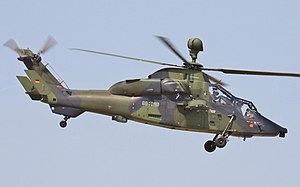AEH-91 Sagittarius: Difference between revisions
Lindenholt (talk | contribs) (Created page with "{|{{Infobox aircraft begin |name = ÆH-91 Sagittarius |image = File:20170810034242!Eurocopter EC-665 Tiger UHT, Germany - Army AN1547188 (2).jpg |caption = Sagittarius in f...") |
Lindenholt (talk | contribs) No edit summary |
||
| Line 91: | Line 91: | ||
** 7x 70 mm (2.75 in) [[Hydra 70]] unguided rockets in a pod | ** 7x 70 mm (2.75 in) [[Hydra 70]] unguided rockets in a pod | ||
}} | }} | ||
[[Category:Aerobus]] | |||
[[Category:Military equipment on Sunalaya]] | |||
{{Aerobus topics}} | |||
Latest revision as of 07:57, 14 April 2019
| ÆH-91 Sagittarius | |
|---|---|

| |
| Sagittarius in flight | |
| Role | Attack helicopter |
| National origin | Ventismar Union |
| Manufacturer | Aerobus |
| First flight | 27 April 1991 |
| Introduction | 2003 |
| Status | In service |
| Primary users | Royal Lindian Air Force ? |
| Produced | 1991–present |
| Number built | 135 as of October 2017 |
| Program cost | $14.5bn |
| Unit cost |
$27.4m
|
| Variants | ÆH-91C Sagittarius |
The ÆH-91 Sagittarius (sometimes written as AEH-91), often referred to it by its designation name Sagittarius, is a twin engine multirole attack helicopter produced by the Ventismarien Aerobus consortium.
The helicopter was designed with an anti-tank role in mind, to be equipped with Bouwer's THOR anti-tank guided missile as its main armament. The end of the Cold War however meant that such an anti-tank role was no longer a priority, leading to design changes that would allow the helicopter to also assume reconnaissance, infantry support and other multirole capabilities. Militarise can choose to equip the helicopter with surface to air missiles, such as the Bouwer LIAM-4, which allows the Sagittarius to assume air defence roles as well.
In 2008 a C-variant was released for use on naval vessels. It was designed to be an anti-naval platform, and can carry torpedoes, anti ship missiles and can deploy depth charges and sonobuoys.
The Sagittarius is the first Ventismarien helicopter to feature a glass cockpit and to be constructed completely out of composite materials. The helicopter's high agility, multirole capabilities and stealth features have made it a successful attack helicopter.
Development and operational history
Operators
Specifications
General characteristics
- Crew: Two: pilot and weapon systems officer
- Length: 14.08 m fuselage (46 ft 2 in)
- Rotor diameter: 13.00 m (42 ft 8 in)
- Height: 3.83 m (12 ft 7 in)
- Disc area: 133 m2 (1,430 ft²)
- Empty weight: 3,060 kg (6,750 lb)
- Loaded weight: 5,090 kg (11,311 lb)
- Max. takeoff weight: 6,000 kg (13,000 lb)
- Internal fuel capacity: 1,080 kg (2,380 lb)
- Powerplant: 2 × Dekkers A47-1D turboshafts, 958 kW (1.303 shp) each
Performance
- Maximum speed: 290 km/h with mast, 315 km/h without mast (157 knots, 181 mph with mast, 170 knots or 196 mph without mast)
- Range: 800 km (430 nm, 500 mi) combat (with external tanks in the inboard stations: 1,300km)
- Service ceiling: 4,000 m (13,000 ft)
- Rate of climb: 10.7 m/s (2,105 ft/min)
- Power/mass: 0.23 hp/lb (0.38 kW/kg)
Armament
- Guns:
- 1× 30 mm (1.18 in) Dekkers RK-30D cannon in chin turret, with up to 450 rounds.
On each of its two inner hardpoints and two outer hardpoints the Sagittarius can carry a combination of the following weapons:
- Inner hardpoints:
- Outer hardpoints: